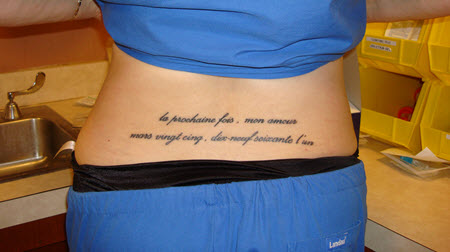Can nurses have tattoos or body piercings? This is the most common question nurses ask when they begin their career. It’s a growing concern in nursing communities as they usually debate if having tattoos or piercings will limit a nurse’s budding career in the future.
Why Is the Medical World Sensitive with Tattoos and Piercings at Work?

There are plenty of reasons why tattoos and piercings may be viewed negatively in a healthcare institution:
- Association with criminal offense – In early times, tattoos and piercings were associated with illegal activities in society. Having visible tattoos or piercings served as reflections of dominant or rebellious behavior in the community. Prisoners also often get inked inside cells as a form of recreation. For these reasons, conservative and elderly individuals associate tattoos and piercings with criminal doings.
- May trigger traumatic memories – Some people, especially Holocaust survivors, have traumatic experiences with tattoos. Seeing tattoos on other people usually reminds them of their time during the Holocaust where they receive coded tattoos as a form of identification in prisons.
- Looks unhygienic for some people – Some conservative persons see tattoos and piercings as dirty and unhygienic. As workers and advocates of good health, healthcare workers are expected to look clean at work. Although the process of tattooing and body piercing became sanitary and standardized throughout the years, older folks still see them dirty for the body.
See Also: 10 Tips and Tricks to Keep Your Nursing Scrubs in Great Shape
What Do Nursing Authorities Say?

Can nurses have tattoos or body piercings according to nursing authorities? Currently, there is no known official policy about nurses with tattoos or piercings. Even the National Student Nurses Association and the American Nurses Association have no official rule or recommendation for body arts in nursing. This topic is still an unresolved issue among nursing bodies around the world.
However, although nursing authorities have no official statement about body arts in nursing, there might be tattoo policies instituted in potential workplaces of nurses. Nursing schools, hospitals, hospice care facilities, home care institutions and clinics have different degrees of restrictions for tattoos and piercings among nurses.
This may include:
− Complete removal of piercings
− Complete cover-up of tattoos using bandaids, bandages or long sleeves
− No tattoos above the collar and lower arms including hands
− No visible tattoos and piercings when wearing scrubs
Because different healthcare institutions have varying body art regulations, there is no unified recommendation or guide yet for nurses planning to get tattoos or piercings. The body arts restrictions imposed in healthcare institutions are based on the premise of minimizing all potential grounds for bacterial growth. This infection control consideration is the same with jewelry and accessory usage regulation among healthcare workers.
Positive Views about Tattoos and Piercings Among Nurses

Although tattoos and piercings are usually viewed negatively at work, there are also advantages of having one as a nurse:
- Icebreakers for patients – Some people are interested with tattoos and piercings. Seeing one in their nurse is often a good conversation starter. It helps in establishing rapport which is useful especially when doing difficult procedures.
- Distraction for pediatric patients – Pediatric patients can get easily amused with tattoos and piercings. Nurses with body art take this as an advantage to establish rapport and to divert their attention during procedures.
- Builds connections – Patients with tattoos and piercings may feel instant connection if their healthcare providers also have the same body art as theirs. Seeing a common ground for body art builds empathy and encourages cooperation.
Is It Best for Nurses to Avoid Tattoos and Piercings?

If you are seriously thinking about body arts, consider the following critical information to know first:
1. Check the policy of your school or the healthcare institution where you are working.
Are they strict with body arts? Do they have detailed policies about having tattoos or piercings?
As discussed above, some institutions may require complete cover-up for visible tattoos while others have a strict no tattoo/piercing policy. Knowing their body art policies will help you decide if you will pursue getting a tattoo or piercing and the best placement for them.
2. Consider tattoo or piercing placement carefully.
If possible, put it in body parts normally covered by scrubs. Because tattoo policies of healthcare institutions greatly vary, it is best to put tattoos where you can easily hide them when needed.
3. Avoid offensive or distracting designs.
For tattoos, avoid bold designs and statements. Tattoo designs that will likely offend or negatively distract a patient are prohibited in most healthcare institutions.
The same thing is true for piercings; piercings in prominent body parts like nose and lips are also prohibited. Extra piercings in ear cartilage are commonly allowed but you have skip putting studs while on duty.
4. Consult for culturally relevant tattoos and piercings.
Culturally relevant tattoos and piercings may be allowed in some institutions especially if they are part of tribal cultures from other nations. For example, some Indian nationals have cultural tattoos and piercings as part of their status reflection in a tribal community.
Most healthcare institutions respect culture-related body arts as part of fair treatment among different nationalities.
5. Avoid tattoos and piercings if you have plans to join the military force in the future.
The United States military force is strict with all kinds of body modification. Any tattoos or piercings deemed to be prejudicial to good order and discipline are prohibited. There are more specific but varying tattoo guidelines in the air force, army, marines, coast guard and navy. For military nurses, a disqualifying tattoo may be a hindrance for rank promotion.
With all this info on body arts, can nurses have tattoos without suffering from limited career options in the future? Since different schools and healthcare institutions have varying policies and regulations about body arts, it is best to weigh all the advantages and disadvantages of tattoos and piercings if you are going to get one. Do your research properly and ask older colleagues about it.
It is also important to consult your nurse manager if you are already working in a healthcare institution. Having tattoos and piercings should not be a limit to a nurse’s career especially if you are having one to express yourself and not just for fun and recreation.



















